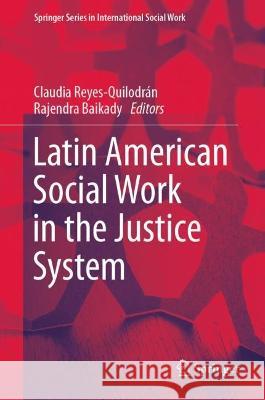Latin American Social Work in the Justice System » książka
Latin American Social Work in the Justice System
ISBN-13: 9783031282201 / Angielski
Latin American Social Work in the Justice System
ISBN-13: 9783031282201 / Angielski
(netto: 498,38 VAT: 5%)
Najniższa cena z 30 dni: 501,19
ok. 16-18 dni roboczych.
Darmowa dostawa!
Social work has long been working directly with the criminal and civil courts of the justice system. The work of Latin American practitioners in the legal system, however, is little known at global and local levels. This book is the first to go beyond Western-centric appraisals and presents a truly Latin American portrait of social work in the justice system.The long-term interaction of social work practitioners with the judicial system enabled them to develop an expertise to dialogue with other disciplines such as law and psychology. This knowledge is very important to identify and share with other professionals to develop specialized programs for education and training. In this sense, positive and negative experiences of social work in the justice system allow one to improve its practice. It is crucial to identify local experiences and the great dilemmas that the profession faces on this subject. The volume's chapters deal with these dynamics in Latin American countries including:Forensic Social Work: The construction of possible ways of the criminal interventionSocio-Legal Social Work in the Field of Criminal DefenseFamily and Community Life: Contributions of Social Work to the Debate in Family CourtsSupport to Victims in High-conflict Scenarios: An approach from the socio-legal, the pedagogical, and the care perspectivesThe Assessment of Child and Adolescent Sexual Abuse Allegations from a Social Work PerspectiveLatin American Social Work in the Justice Systemis essential reading for students, researchers, academicians, policymakers, and practitioners who are interested in international social work with a special focus on Latin American countries and legal culture. Students and scholars in law, development studies, and public policy as well as psychologists working with and interested in the judicial system would also find this book a useful resource.
Social work has long been working directly with the criminal and civil courts of the justice system. The work of Latin American practitioners in the legal system, however, is little known at global and local levels. This book is the first to go beyond Western-centric appraisals and presents a truly Latin American portrait of social work in the justice system. The long-term interaction of social work practitioners with the judicial system enabled them to develop an expertise to dialogue with other disciplines such as law and psychology. This knowledge is very important to identify and share with other professionals to develop specialized programs for education and training. In this sense, positive and negative experiences of social work in the justice system allow one to improve its practice. It is crucial to identify local experiences and the great dilemmas that the profession faces on this subject. The volume's chapters deal with these dynamics in Latin American countries including:
- Forensic Social Work: The construction of possible ways of the criminal intervention
- Socio-Legal Social Work in the Field of Criminal Defense
- Family and Community Life: Contributions of Social Work to the Debate in Family Courts
- Support to Victims in High-conflict Scenarios: An approach from the socio-legal, the pedagogical, and the care perspectives
- The Assessment of Child and Adolescent Sexual Abuse Allegations from a Social Work Perspective











